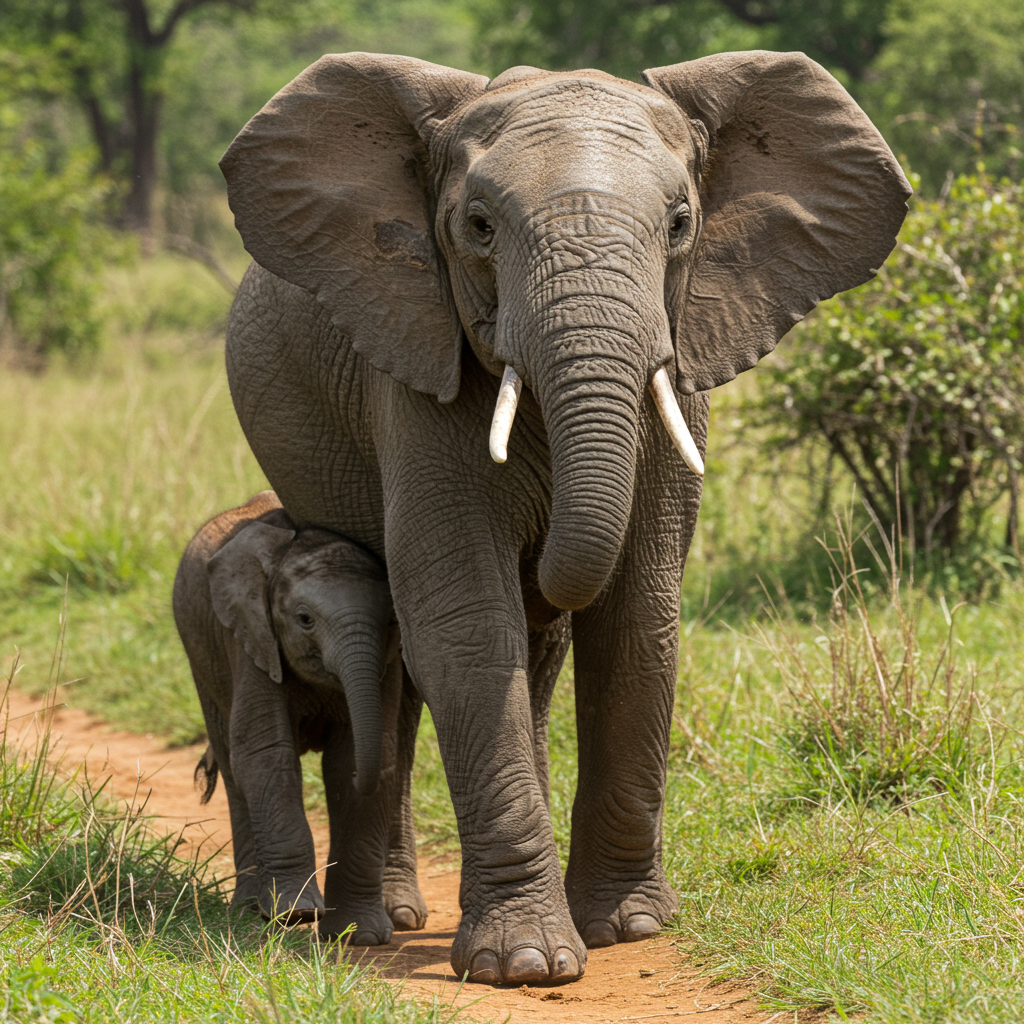A shocking incident during a walking safari in Zambia’s South Luangwa National Park has resulted in the deaths of two elderly female tourists, one from New Zealand and one from the United Kingdom. The women were tragically killed by a charging female elephant protecting her calf on the morning of Thursday, July 3rd, 2025. This heartbreaking event highlights the inherent risks of close wildlife encounters, even in guided safari settings.
The victims have been identified as 68-year-old Easton Janet Taylor from the UK and 67-year-old Alison Jean Taylor from New Zealand. They were part of a small group on a walking safari, a popular activity offering a more intimate connection with nature in the African bush. The group included an armed wildlife police officer and at least two other individuals, led by experienced guides.
Fatal Encounter in South Luangwa
The tragedy unfolded around 6:20 am local time near the Big Lagoon Camp within the vast South Luangwa National Park. This park, located in eastern Zambia, is renowned for its abundant wildlife, including large elephant populations. It sits approximately 600 kilometers (370 miles) east of Zambia’s capital city, Lusaka.
The group was walking between two camps, heading towards a river crossing point on the Luangwa River. They reportedly spotted a female elephant with a calf some distance away. In an effort to avoid disturbing the animals, the guides attempted to alter their path, diverting by about 50 meters.
However, within minutes of this diversion, the situation escalated rapidly. The female elephant, likely perceiving a threat to her young, began charging towards the group at high speed. The armed officer, typically positioned at the rear for protection, witnessed the charge and shouted a warning.
Despite attempts by the guides and the officer to deter the animal, the elephant reached the group. The charging animal first caught Alison Jean Taylor. The police officer fired shots, hitting and wounding the elephant in a desperate effort to stop the attack. Tragically, the determined animal continued its charge and then caught Easton Janet Taylor. Both women sustained fatal injuries during the encounter and died at the scene.
Understanding Elephant Behavior
Elephants, particularly female elephants with calves, are known for their powerful protective instincts. A mother elephant weighing up to 3600 kg can become incredibly aggressive if she feels her offspring is in danger. Even a perceived threat can trigger a charge. This tragic event underscores the unpredictable nature of wild animals and the potential dangers of being in close proximity, even when trying to give them space. While attempts were made to wound the elephant and stop the charge, its maternal instincts drove it forward with deadly force.
Risks and Realities of Walking Safaris
Walking safaris offer an exhilarating experience, allowing tourists to feel truly immersed in the wilderness. Unlike vehicle-based safaris, walking provides a different perspective, focusing on tracking, smaller details of the ecosystem, and the thrill of being on foot in wild territory. However, this intimacy comes with increased risks, as participants are exposed and on the animals’ level.
Reputable walking safaris are conducted by highly trained guides and often accompanied by armed rangers or scouts. These professionals are skilled in reading animal behavior, understanding the environment, and taking necessary precautions. They carry firearms as a last resort for protection. Despite these safety measures, fatal encounters, though statistically rare, can still occur, as demonstrated by this devastating incident.
Previous Incidents in Zambia and Beyond
This tragedy is not an isolated event involving elephants and tourists in Zambia, though walking safari attacks are less common than those involving vehicles. Last year, in 2023, Zambia experienced two separate fatal elephant encounters involving American tourists, both elderly women.
In March 2023, 79-year-old Gail Mattson from Minnesota was killed in Kafue National Park when a bull elephant charged the safari vehicle she was in, causing it to overturn.
Later, in June 2023, 64-year-old Juliana Gle Tourneau from New Mexico died near Livingstone. Reports indicate her group had stopped the vehicle due to traffic from an elephant herd, and she left the vehicle, which was reportedly a breach of park regulations, before being attacked and trampled by an elephant.
These incidents highlight that risks exist even within vehicles, though the nature of the threat differs. The recent South Luangwa attack specifically involved a walking group, underscoring that different safari types present unique challenges and safety considerations.
Fatal elephant encounters are also unfortunately reported in other parts of the world. Recent years have seen similar tragedies in Kenya, South Africa (including Kruger Park), and Thailand, often involving unexpected charges or breaches of safety protocols like leaving vehicles or interacting too closely with animals in sanctuaries. Zambian authorities had previously urged tourists to be extremely cautious when observing wildlife following earlier fatalities, advice that remains critically relevant.
Ensuring Safety on Wildlife Safaris
Experiencing wildlife in its natural habitat is an incredible privilege. To minimize risks on any safari, especially walking safaris, tourists should prioritize safety above all else.
Choose Reputable Operators: Select safari companies with experienced, well-trained guides and armed rangers who have proven safety records.
Listen to Guides: Always follow the instructions of your guides implicitly. They are experts in the local environment and animal behavior.
Maintain Distance: Respect the required safe distance from animals. Guides will ensure this, but tourists should avoid any actions that could provoke wildlife.
Stay Calm: In unexpected encounters, remain calm and follow your guide’s lead. Sudden movements or loud noises can sometimes trigger a defensive reaction from animals.
- Understand the Environment: Be aware that you are in wild territory where animals are unpredictable. Fatal incidents, though rare, are a possibility.
- www.theguardian.com
- www.cbsnews.com
- www.nzherald.co.nz
- www.dailymail.co.uk
- www.mirror.co.uk
This tragic event serves as a somber reminder that despite extensive safety measures and experienced guides, interacting with powerful wild animals carries inherent dangers. The instinctual protective nature of a mother elephant proved overwhelming in this instance.
Frequently Asked Questions
What happened during the elephant attack in Zambia that killed two tourists?
During a walking safari in South Luangwa National Park on July 3rd, 2025, a female elephant with a calf charged a group of tourists and guides. Despite the group attempting to divert their path and the armed guide firing shots, the elephant fatally attacked two elderly women, Easton Janet Taylor (UK) and Alison Jean Taylor (NZ), who died at the scene.
Where exactly did the fatal elephant attack occur in Zambia?
The incident took place in South Luangwa National Park, located in eastern Zambia. Specifically, the attack occurred during a walking safari near the Big Lagoon Camp, as the group was moving between two camps towards a river crossing point on the Luangwa River. South Luangwa is approximately 600 kilometers from Zambia’s capital city, Lusaka.
Are walking safaris in Zambia safe after this incident, and what should tourists know?
While devastating, fatal elephant attacks on walking safaris are rare. Walking safaris in Zambia with reputable operators are typically conducted by highly trained guides and armed rangers who prioritize safety. However, this event underscores that inherent risks exist when on foot in wild territory. Tourists should choose reputable operators, always follow guide instructions precisely, maintain recommended distances from wildlife, and remain aware that wild animals are unpredictable.
Conclusion: The loss of Easton Janet Taylor and Alison Jean Taylor is a profound tragedy. It highlights the raw power and unpredictable nature of wildlife. While safaris offer unparalleled opportunities to witness animals in their natural habitat, they require respect for the environment and strict adherence to safety guidelines provided by experienced professionals. Our thoughts are with the families affected by this devastating event in the Zambian wilderness.



